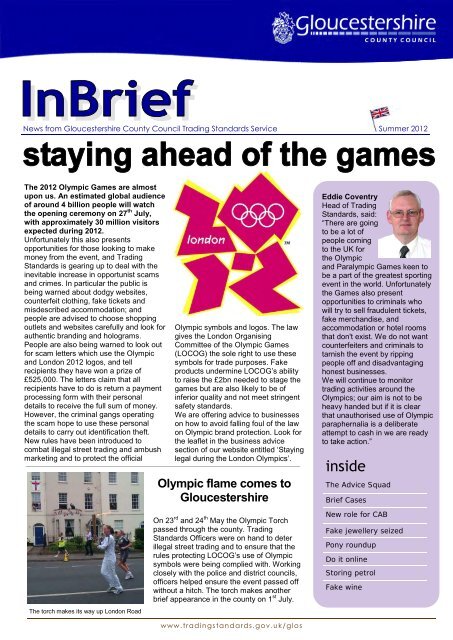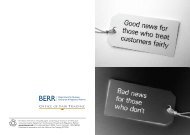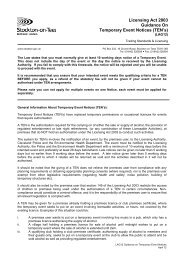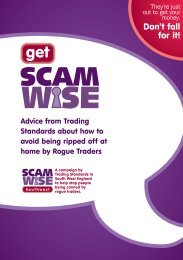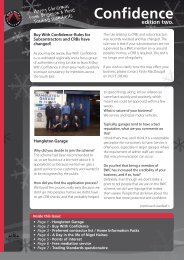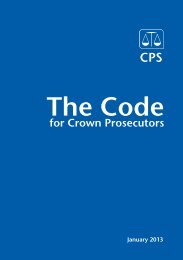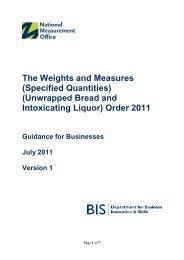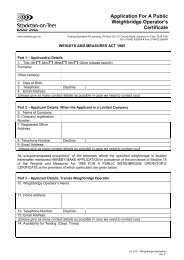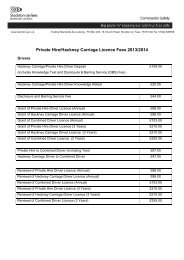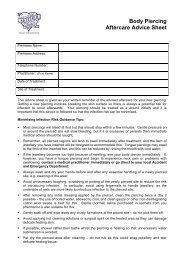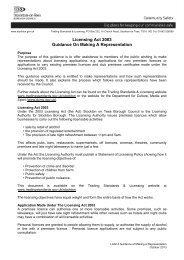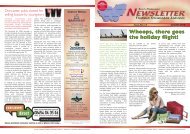Summer 2012 - Trading Standards Institute
Summer 2012 - Trading Standards Institute
Summer 2012 - Trading Standards Institute
Create successful ePaper yourself
Turn your PDF publications into a flip-book with our unique Google optimized e-Paper software.
News from Gloucestershire County Council <strong>Trading</strong> <strong>Standards</strong> Service <strong>Summer</strong> <strong>2012</strong><br />
The <strong>2012</strong> Olympic Games are almost<br />
upon us. An estimated global audience<br />
of around 4 billion people will watch<br />
the opening ceremony on 27 th July,<br />
with approximately 30 million visitors<br />
expected during <strong>2012</strong>.<br />
Unfortunately this also presents<br />
opportunities for those looking to make<br />
money from the event, and <strong>Trading</strong><br />
<strong>Standards</strong> is gearing up to deal with the<br />
inevitable increase in opportunist scams<br />
and crimes. In particular the public is<br />
being warned about dodgy websites,<br />
counterfeit clothing, fake tickets and<br />
misdescribed accommodation; and<br />
people are advised to choose shopping<br />
outlets and websites carefully and look for<br />
authentic branding and holograms.<br />
People are also being warned to look out<br />
for scam letters which use the Olympic<br />
and London <strong>2012</strong> logos, and tell<br />
recipients they have won a prize of<br />
£525,000. The letters claim that all<br />
recipients have to do is return a payment<br />
processing form with their personal<br />
details to receive the full sum of money.<br />
However, the criminal gangs operating<br />
the scam hope to use these personal<br />
details to carry out identification theft.<br />
New rules have been introduced to<br />
combat illegal street trading and ambush<br />
marketing and to protect the official<br />
The torch makes its way up London Road<br />
Olympic symbols and logos. The law<br />
gives the London Organising<br />
Committee of the Olympic Games<br />
(LOCOG) the sole right to use these<br />
symbols for trade purposes. Fake<br />
products undermine LOCOG‟s ability<br />
to raise the £2bn needed to stage the<br />
games but are also likely to be of<br />
inferior quality and not meet stringent<br />
safety standards.<br />
We are offering advice to businesses<br />
on how to avoid falling foul of the law<br />
on Olympic brand protection. Look for<br />
the leaflet in the business advice<br />
section of our website entitled „Staying<br />
legal during the London Olympics‟.<br />
Olympic flame comes to<br />
Gloucestershire<br />
On 23 rd and 24 th May the Olympic Torch<br />
passed through the county. <strong>Trading</strong><br />
<strong>Standards</strong> Officers were on hand to deter<br />
illegal street trading and to ensure that the<br />
rules protecting LOCOG‟s use of Olympic<br />
symbols were being complied with. Working<br />
closely with the police and district councils,<br />
officers helped ensure the event passed off<br />
without a hitch. The torch makes another<br />
brief appearance in the county on 1 st July.<br />
Eddie Coventry<br />
Head of <strong>Trading</strong><br />
<strong>Standards</strong>, said:<br />
“There are going<br />
to be a lot of<br />
people coming<br />
to the UK for<br />
the Olympic<br />
and Paralympic Games keen to<br />
be a part of the greatest sporting<br />
event in the world. Unfortunately<br />
the Games also present<br />
opportunities to criminals who<br />
will try to sell fraudulent tickets,<br />
fake merchandise, and<br />
accommodation or hotel rooms<br />
that don't exist. We do not want<br />
counterfeiters and criminals to<br />
tarnish the event by ripping<br />
people off and disadvantaging<br />
honest businesses.<br />
We will continue to monitor<br />
trading activities around the<br />
Olympics; our aim is not to be<br />
heavy handed but if it is clear<br />
that unauthorised use of Olympic<br />
paraphernalia is a deliberate<br />
attempt to cash in we are ready<br />
to take action.”<br />
inside<br />
The Advice Squad<br />
Brief Cases<br />
New role for CAB<br />
Fake jewellery seized<br />
Pony roundup<br />
Do it online<br />
Storing petrol<br />
Fake wine<br />
www .tradi ngs tandards .g ov.uk/gl os
Martin gives advice on consumer law<br />
Consumer Direct helpline now<br />
run by Citizens Advice<br />
The Citizens Advice consumer<br />
service took over responsibility for<br />
providing consumer advice and<br />
information from Consumer Direct<br />
on 1 April <strong>2012</strong>.<br />
As part of the government‟s<br />
spending review the Consumer<br />
Direct helpline has been taken over<br />
by the Citizens Advice Bureau, a<br />
charity, and the Office of Fair<br />
<strong>Trading</strong> (OFT) is being stripped of<br />
its consumer protection role and is<br />
to be merged with the Competition<br />
Commission.<br />
<strong>Trading</strong> standards services are<br />
being asked to deal with the OFT's<br />
previous high-profile work in taking<br />
on major consumer issues.<br />
Consumers seeking advice should<br />
contact the Citizens Advice<br />
consumer helpline in the first<br />
instance which will forward serious<br />
cases on to trading standards - we<br />
will no longer be able to offer a<br />
walk-in service to consumers.<br />
The helpline can be contacted on<br />
08454 04 05 06, or online.<br />
Your right to cancel<br />
Case 1: A consumer took out a 2 year<br />
extended warranty on a new boiler. When the<br />
policy was due for renewal he initially agreed<br />
to extend it further but on reflection wrote<br />
several times to the company to cancel. The<br />
company ignored his requests. John took up<br />
the case and the company then sent out a<br />
refund cheque.<br />
Case 2: An elderly consumer paid a<br />
substantial deposit to a building firm to install<br />
garage doors. The contract had been signed<br />
at home during a salesperson‟s visit. The<br />
company did not start work on the agreed<br />
day and ignored the consumer‟s messages.<br />
Helen investigated and found the company<br />
was still trading and that the consumer had<br />
not been given cancellation rights. The<br />
company agreed to refund the consumer.<br />
The shop offered to take some of the<br />
furniture away but this would leave the<br />
consumer with an incomplete suite.<br />
After discussing the complaint with Liz<br />
the retailer agreed to supply a suitable<br />
suite and refund the customer the<br />
difference in price.<br />
Suite success<br />
Usually when you buy at<br />
home or online you will have<br />
a right in law to cancel the<br />
contract. Consumers have<br />
up to 14 days to cancel<br />
agreements to purchase<br />
financial products, which<br />
include extended warranties.<br />
The refund should be made<br />
within 30 days of the notice<br />
of cancellation.<br />
When you agree to work<br />
during a trader‟s visit to your<br />
home you should in most<br />
cases be given a written<br />
notice of a right to cancel. If<br />
the work is to start within the<br />
7 day cooling off period the<br />
trader must also get you to<br />
agree in writing for the work<br />
to go ahead.<br />
Liz dealt with a complaint about furniture that<br />
did not fit into a consumer‟s living room. The<br />
consumer had given accurate measurements<br />
of the room to the sales assistant and was<br />
assured that the suite would fit – it didn‟t.<br />
Normally it is the consumer‟s<br />
responsibility to ensure that furniture<br />
ordered will fit, but in this case the<br />
consumer relied on the care and skill<br />
of the staff in making her decision<br />
and was specifically assured by the<br />
salesperson that it would fit. The fact<br />
that it did not meant the shop was in<br />
breach of contract.<br />
Mag ads<br />
A trader was surprised to receive a<br />
demand for payment for an advertisement<br />
in a magazine. He queried it and was given<br />
the name of an employee who had agreed<br />
to the advertisement. However the<br />
employee had not been in work on the day<br />
the agreement was said to have been<br />
made. The demands for payment continued<br />
with threats of legal action. Paul was able to<br />
reassure the trader that it would be up to<br />
the publisher to produce evidence that a<br />
contract had been agreed.<br />
We hear from a lot of businesses<br />
who are contacted in this way. If a<br />
business has agreed to an<br />
advertisement it will be liable for<br />
payment, there is no right to cancel,<br />
but we are aware of many bogus<br />
publishing companies who will phone<br />
to offer their services and then use<br />
any information they gather to assert<br />
that a contract has been formed with<br />
escalating threats of action to attempt<br />
to persuade the trader to pay up.
iefCASES<br />
some of the cases brought before the courts since the last issue<br />
Illegal tobacco<br />
SEIZED IN<br />
Following a <strong>Trading</strong> <strong>Standards</strong> investigation, Soran Talibani, 33, and Sako<br />
Fatahi, 32, of Gloucester Groceries, Station Road, Gloucester appeared in<br />
court in March to face charges of supplying illegal tobacco, some of which<br />
was counterfeit, between August and December 2011.<br />
Approximately 22,000 cigarettes and 40kg of hand rolling<br />
tobacco was seized in a number of raids, which included the<br />
use of a specialist sniffer dog to uncover cigarettes hidden<br />
inside a storage heater.<br />
Both defendants pleaded guilty, Talibani was found guilty of all<br />
25 charges, while Fatahi was found guilty of 17 charges.<br />
They were later sentenced to prison terms of 36 weeks<br />
and 30 weeks respectively.<br />
Counterfeit DVDs<br />
Sen Qiang Lin, 30, of Springfield Road,<br />
Birmingham was caught selling counterfeit films<br />
and tobacco at Southam car boot sale in the<br />
summer of 2010.<br />
Soon after he was caught again selling DVDs<br />
in the street in Cheltenham. He admitted that he<br />
had previously been issued with a caution and a<br />
suspended sentence for selling counterfeit goods.<br />
When he was caught in Cheltenham, his suspended sentence was still in<br />
force and he therefore breached the conditions that applied. Over 500<br />
DVDs, some not classified by the British Board of Film Classification<br />
(BBFC), were seized as well as 49 pouches of counterfeit tobacco.<br />
Mr Lin pleaded guilty to eleven charges, one for selling counterfeit tobacco;<br />
nine for selling counterfeit DVDs and one for selling un-classified DVDs.<br />
The penalty was 160 hours unpaid work and he was asked to pay £200<br />
towards prosecution costs. He was also given a 12 week prison sentence<br />
which was suspended for 18 months.<br />
Unqualified electrician<br />
Levi Kelly, trading as LSK Electricals Ltd, appeared at<br />
Cheltenham Magistrates Court in February to plead guilty<br />
to misleading customers regarding his qualifications and<br />
approval.<br />
The court heard how Mr Kelly had told a consumer that he<br />
was competent to carry out electrical work to Part P<br />
requirements and issued a bogus certificate of compliance with<br />
the standard. Part P is a standard of installation which ensures<br />
that electrical installations are safe. Consumers who have<br />
installation work which is not signed off by a competent installer<br />
can face additional cost in having the work redone or confirmed<br />
as meeting safety requirements.<br />
The defendant was ordered to pay a contribution of £100 to<br />
<strong>Trading</strong> <strong>Standards</strong> court costs and £326 to the consumer involved.<br />
Fake Pandora jewellery with an<br />
estimated retail value if genuine<br />
of at least £500,000 was seized<br />
from a property in Gloucester in<br />
February.<br />
The raid was carried out by<br />
trading standards assisted by<br />
Gloucestershire police and<br />
followed receipt of information<br />
about a trader believed to be<br />
supplying counterfeit jewellery,<br />
claiming to be Pandora. The<br />
jewellery was being sold through<br />
Amazon and other websites.<br />
A representative from Pandora‟s<br />
investigation team, TM-Eye, also<br />
assisted in the raid.<br />
Similar counterfeit silver jewellery<br />
seized in 2011 by trading<br />
standards was found to contain<br />
higher than permitted levels of<br />
nickel. We are now establishing<br />
whether these fake products pose<br />
a safety risk to consumers.<br />
Cllr Will Windsor-Clive, Cabinet<br />
Member for Communities, said:<br />
“Congratulations to our <strong>Trading</strong><br />
<strong>Standards</strong> service for yet another<br />
effective investigation which will<br />
bring benefits to reputable<br />
businesses and consumers<br />
throughout the county.
Animal Health Officers were called to assist earlier in the year when 4<br />
ponies were found wandering around Waterwells Business Park. The<br />
officers went to the site and worked with police to ensure that the<br />
ponies did not come to any harm.<br />
The animals were very nervous but after a lot of patient work, they<br />
were eventually tethered with the help of staff from the Equestrian<br />
centre. Officers arranged for a charity to take care of the ponies while<br />
attempts were made to locate the owners who had abandoned them.<br />
Wine connoisseurs in the county have<br />
been urged to be on the lookout for<br />
illegal wine.<br />
The request comes after officers, acting<br />
on a complaint from a member of the<br />
public, seized a quantity of illegal wine<br />
after visiting a Cheltenham restaurant.<br />
The wine was labelled Pinot Grigio<br />
produced in Bulgaria. All wine should<br />
have the producer details and the region<br />
of production on the label, but this<br />
information was missing on the illegal<br />
bottles. Please call if you have been<br />
supplied with this illegal wine to help us<br />
in our investigation.<br />
Poisons sellers and firework retailers can now<br />
apply and pay for their licences online thanks to<br />
the new interactive web features introduced by<br />
Gloucestershire County Council.<br />
The online forms aim to provide applicants with<br />
a step by step user-friendly way of applying for<br />
a licence. We hope in due course to make all<br />
our licence applications available in this way.<br />
This is in line with the policy of reducing costs<br />
by enabling our customers to use our services<br />
via the web rather than by direct contact.<br />
One of the functions of <strong>Trading</strong> <strong>Standards</strong> is the licensing of petrol<br />
storage in the county. We are often asked how much fuel can be stored<br />
at home before a licence is necessary. This was particularly true during<br />
the recent threat of a tanker drivers‟ strike when a government minister<br />
advised keeping a „couple of jerry cans in the garage‟.<br />
Storing fuel presents a potential hazard. Petrol and other fuels give off<br />
vapour which are extremely flammable and should be treated with the<br />
utmost care.<br />
Storage of fuel at home or the workplace, unless licensed, is restricted<br />
by law to either metal containers with a maximum capacity of 10 litres<br />
or approved plastic containers of a maximum 5 litres capacity. These<br />
containers should be designed for the purpose and must be fitted with a<br />
screw cap or closure to prevent leakage of liquid or vapour. Petrol and diesel fuel should be stored in no more than two<br />
10 litre metal containers or two 5 litre plastic containers. They should be clearly labelled to indicate their contents.<br />
Petrol filling stations operate under licence conditions, which do not allow drivers to dispense fuel into other types of<br />
container. At home, fuel containers must not be stored in living accommodation such as kitchens, living rooms and<br />
bedrooms or under staircases. Any storage place should be well away from living areas in case of fire and it should be<br />
secured, to protect against the possibility of vandalism or arson.<br />
If you have any enquiries about InBRIEF please contact Simon Doble at tradstds@gloucestershire.gov.uk<br />
For more information visit our website at: www.tradingstandards.gov.uk/glos


